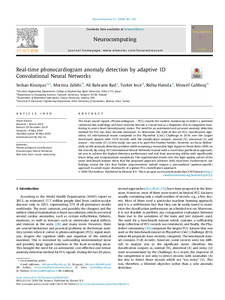Real-time Phonocardiogram Anomaly Detection by Adaptive 1D Convolu‐ tional Neural Networks
Kiranyaz, Serkan; Zabihi, Morteza; Rad, Ali Bahrami; Ince, Turker; Hamila, Ridha; Gabbouj, Moncef (2020-05-19)
Kiranyaz, Serkan
Zabihi, Morteza
Rad, Ali Bahrami
Ince, Turker
Hamila, Ridha
Gabbouj, Moncef
19.05.2020
Julkaisun pysyvä osoite on
https://urn.fi/URN:NBN:fi:tuni-202008256649
https://urn.fi/URN:NBN:fi:tuni-202008256649
Kuvaus
Peer reviewed
Tiivistelmä
The heart sound signals (Phonocardiogram - PCG) enable the earliest monitoring to detect a potential cardiovascular pathology and have recently become a crucial tool as a diagnostic test in outpatient monitoring to assess heart hemodynamic status. The need for an automated and accurate anomaly detection method for PCG has thus become imminent. To determine the state-of-the-art PCG classification algorithm, 48 international teams competed in the PhysioNet (CinC) Challenge in 2016 over the largest benchmark dataset with 3126 records with the classification outputs, normal (N), abnormal (A) and unsure – too noisy (U). In this study, our aim is to push this frontier further; however, we focus deliberately on the anomaly detection problem while assuming a reasonably high Signal-to-Noise Ratio (SNR) on the records. By using 1D Convolutional Neural Networks trained with a novel data purification approach, we aim to achieve the highest detection performance and real-time processing ability with significantly lower delay and computational complexity. The experimental results over the high-quality subset of the same benchmark dataset show that the proposed approach achieves both objectives. Furthermore, our findings reveal the fact that further improvements indeed require a personalized (patient-specific) approach to avoid major drawbacks of a global PCG classification approach.
Kokoelmat
- TUNICRIS-julkaisut [16882]
